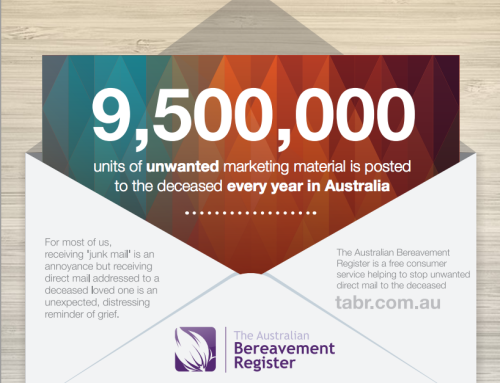Trying to get in touch with deceased Australians costs charities both financially and through loss of reputation. That’s where The Australian Bereavement Register can help.
With tax-time fast approaching, a major consideration is whether your charity may inadvertently attempt to contact someone who has passed away, whether it’s by mail, e-mail or phone. As well as distressing the person’s loved ones, these blunders are disastrous to a charity’s brand and reputation. Now, they also breach the ADMA Code of Practice. Introduced last September, this highlights that direct mailers must ensure data is properly sourced, permissioned and cleaned.
Just how big is the problem? Every year some 1.425 million pieces of charity direct mail are sent to people who have died, according to Conexum Data Management Services. Based on an average pack cost of $2, this represents waste of around $2.85 million, on top of the serious offence it causes. But how can charities discover when they need to revise their records? One solution is Conexum’s data suppression file product, The Australian Bereavement Register (TABR).
Launched in 2012, TABR collects the details of recently deceased individuals directly from their families and friends, usually within 14 days, says Glenn Harrison, who is the Managing Director of Conexum Data Management Services. To facilitate this, a dedicated call centre is operated seven days a week that people can phone.
“Amendments are made daily to the register after they’ve gone through a unique validation process to make sure they are bona fide.”
So when charities embark on direct marketing activity, for example their tax campaign, they can wash their donor files and prospect lists against a reliable list, which now includes the names of 420,000 deceased Australians, and update their own records accordingly.
“This is much more than a significant cost saving,” adds Harrison. “It prevents charities from inadvertently upsetting grieving families and friends, with all of the personal and reputational damage that incurs. Plus it means that reporting on the performance of a campaign is not compromised by the inclusion of records that can’t be contacted.”
He also notes that washing data against the TABR is advisable on a regular basis, given that approximately 140,000 people die every year in Australia and they’ll receive an estimated 68 pieces of direct mail each after they’re gone.
* This article first appeared in the Australasia Fundraising & Philanthropy Magazine







